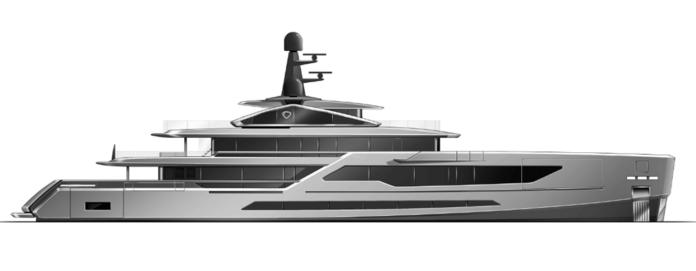The zero-carbon power source will allow owners to venture into waters where diesel propulsion is prohibited, and more.
Asilent, limitless, zero-carbon power source that can run on ocean water might seem like the stuff of a Jules Verne novel, but the sci-fi-sounding technology of the hydrogen fuel cell will soon be a reality in yachting.
For an industry that adopts new technology at a glacial pace, using this type of experimental power on a superyacht costing tens of millions of dollars is a bold and financially daring step. But four shipyards are outfitting new builds with fuel cells anyway. The first is expected to splash in 2024. If it succeeds, it may one day supplant the hybrid diesel-electric engines and solar-powered sailboats that have served as a first step toward nautical sustainability.
“Someone has to be the pioneer,” says Michael Breman, sales director at Lürssen Yachts, referring to an unnamed superyacht under construction at the company’s German headquarters. Lürssen, which has built many of the world’s largest, most complicated superyachts, won’t even reveal the vessel’s length. But Breman credits the owner, who also wants to remain anonymous, as someone looking toward the future with enthusiasm: “He’s smart about it. He didn’t jump in without taking stock of everything.”
Harnessing hydrogen presents big challenges: Just storing the highly flammable element in both liquid and gaseous forms requires extremely large, specially outfitted tanks that can consume valuable real estate across a boat’s interior. Plus, waterside hydrogen fueling stations are largely nonexistent. In order to bypass these limitations, Lürssen is using methanol—which can be housed in conventional tanks and converted to hydrogen—as the main fuel source. (The process produces less CO2 than burning diesel, and some forms of methanol can be converted with zero harmful emissions.) Once the fuel cell turns the hydrogen into electricity, it can be used or stored in lithium-ion battery banks. That clean energy powers electric engines, while the cell continues to generate electricity. The fuel cell will run as long as it’s fed hydrogen.
A rendering of Lürssen’s game-changing fuel cell. Courtesy of Lürssen Yachts
Lürssen and its partner, the Freudenberg Group, have been working on their fuel cell since 2019 and plan to start final testing this spring. The other big benefit of this system is that the cell “doesn’t have any moving parts, so there’s no noise or vibration,” says Breman.
The fuel cell won’t power the yacht’s main propulsion but instead will run the house load—mainly electricity and air-conditioning—in blissful silence for 15 days, or move the boat at a slow, net-zero-emissions pace for 1,000 miles. Both are significant breakthroughs since they will allow the yacht to stay away from port for weeks or travel into environmentally sensitive waters restricted to electric vessels.
Italian builder Baglietto says it’s building a fuel cell prototype that will be on display at its shipyard by the end of the year. The system can be installed on yachts 171 feet or longer and delivered by the end of 2024 or early 2025. (Sanlorenzo plans to debut its own system around the same time; Feadship also has a fuel-cell system in the works but remains mum on launch dates.)
Baglietto’s system captures hydrogen directly from ocean water, and you can also fill its storage tanks with commercially sourced hydrogen. Like Lürssen’s, its system will power the house load while delivering a silent, slow-mo cruise of six to nine knots. “One of our big goals is to extend the range in zero-emissions mode,” says Alessandro Balzi, director of Baglietto’s energy department. “It allows a yacht into areas where diesel propulsion is prohibited.”
While these systems represent an important step-change in sustainable technology, nobody expects a true, zero-carbon yacht for at least a decade. “Clean energy is not yet there for the main engines,” says Tankoa CEO Vincenzo Poerio, one of yachting’s early adopters of hybrid diesel-electric engines. Hydrogen fuel cells will be a critical component but not the total solution—at least not for a while. “We’ll see multiple systems coming together to feed our need for clean energy—possibly even nuclear-fusion power,” says Poerio. “Owners are asking for yacht designs now that can be swapped out as those systems mature over the next 10 years.”






